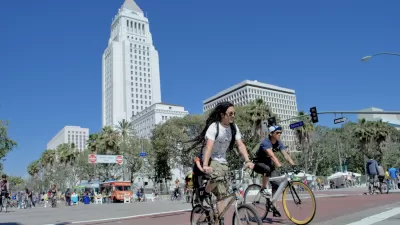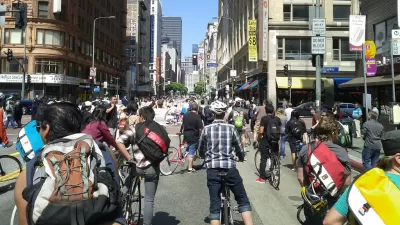Days before the American Planning Association's national convention, CicLAvia's Aaron Paley describes the event's origins and evolution and explains how an open streets event in Los Angeles can transform one's sense of public space and the city.
On Sunday, April 15th, LA neighborhoods from East Hollywood to Boyle Heights will transform, as major boulevards become car-free pedestrian and bike spaces during CicLAvia. The Planning Report sat down with Aaron Paley, president of Community Arts Resources (CARS) and a founder of the public event, to discuss the conceptual underpinnings of the CicLAvia, how it is organized, and where it is growing and evolving. Inspired by the weekly Ciclovia in Bogotá, the Los Angeles event is expected to attract over 100,000 participants, and planners hope to see it happen more often and in different neighborhoods across the large city.
Paley emphasizes that CicLAvia, in his mind, is not just about bicycles and exercise-it's a fun experience of public space that transforms one's concept of how we as individuals relate to the city. CicLAvia is an opportunity for residents to see, smell, and hear the streets of Los Angeles without its famous traffic. Paley notes, "For planners, really, the lesson that can be taken away here is that temporary interventions-light, quick, cheap, ways of transforming the city-can be just as influential as brick, mortar, and concrete. Through this method we can take more risks and show how things can get done in a demonstrative way."
Thanks to Kevin Madden
FULL STORY: CicLAvia's Aaron Paley on the Spectacle's Trajectory, Notions of Public Space

Maui's Vacation Rental Debate Turns Ugly
Verbal attacks, misinformation campaigns and fistfights plague a high-stakes debate to convert thousands of vacation rentals into long-term housing.

Planetizen Federal Action Tracker
A weekly monitor of how Trump’s orders and actions are impacting planners and planning in America.

In Urban Planning, AI Prompting Could be the New Design Thinking
Creativity has long been key to great urban design. What if we see AI as our new creative partner?

King County Supportive Housing Program Offers Hope for Unhoused Residents
The county is taking a ‘Housing First’ approach that prioritizes getting people into housing, then offering wraparound supportive services.

Researchers Use AI to Get Clearer Picture of US Housing
Analysts are using artificial intelligence to supercharge their research by allowing them to comb through data faster. Though these AI tools can be error prone, they save time and housing researchers are optimistic about the future.

Making Shared Micromobility More Inclusive
Cities and shared mobility system operators can do more to include people with disabilities in planning and operations, per a new report.
Urban Design for Planners 1: Software Tools
This six-course series explores essential urban design concepts using open source software and equips planners with the tools they need to participate fully in the urban design process.
Planning for Universal Design
Learn the tools for implementing Universal Design in planning regulations.
planning NEXT
Appalachian Highlands Housing Partners
Mpact (founded as Rail~Volution)
City of Camden Redevelopment Agency
City of Astoria
City of Portland
City of Laramie




























